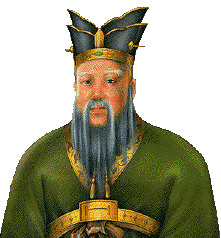August 27: Confucius
Confucius (551 BCE)
It was on this date, August 27, 551 BCE, by tradition, that the Chinese teacher and philosopher K'ung fu-tzu (孔子 Pinyin Kǒng Zǐ), known popularly by his Latinized name, Confucius, was born in the state of Lu. Though fatherless from the age of three, Confucius nevertheless acquired a good education and married at the age of 19, producing one son and two daughters. His mother died when Confucius was 24, and soon thereafter he began traveling about and teaching, usually instructing a small number of disciples he eventually drew to him in the second half of the Zhou (Chou) dynasty (1027?-256 BC).
Confucian philosophy is simple: to love others; to honor one's forbears; to do what is right instead of what is of advantage; to practice "reciprocity," i.e., "don't do to others what you would not want done to yourself" — what Christians would call the Golden Rule — and, if in power, to rule by moral suasion instead of by force and violence. Indeed, Confucius thought that a ruler who had to resort to force had already failed as a ruler. As he said in his Analects (論語), "Your job is to govern, not to kill" (XII:19).
Even though he was called Master K'ung, Confucius never had any pretensions of founding a religion. Confucianism is unique in history as an ethic with no religious content, no mysticism. The term for "god" in his Analects is often translated "spirit" or even "spiritual beings." Therefore, his advice regarding religions was, "Respect spiritual beings if there are any, but keep away from them." In the Analects, Chi-lu asked how the spirits of the dead and gods should be served. Confucius said, "You are not able to serve man. How can you serve the spirits?" (XI:12)
The best imagined portrayal of the idea Confucius had toward immortality is in the 1981 novel Creation by Gore Vidal. In it, the narrator, Cyrus Spitana, asks Confucius:
"But what about all those people who say that they have seen the spirits of the dead?"
"Well," he said, "I've talked to many people who think that they've seen the spirits of the dead, and I always ask them one question, which shocks them. Was the ghost naked? Invariably, they tell me, the spirit is wearing the clothes that he was buried in. Now, we know that silk and linen and lamb's wool are inanimate and soulless. We also know that when a man dies, his clothes rot just as he does. So how can his spirit put them on again?"
"Perhaps the spirit only seems to be dressed," I said feebly.
"Perhaps the spirit only seems. Perhaps the spirit does not exist at all except in the mind of a frightened man." (p. 436)
For more than 2,000 years, since the death of Confucius in 479 BCE, Confucianism has been the general creed of educated Chinese. But it was never a religion.
Originally published August 2003 by Ronald Bruce Meyer.


